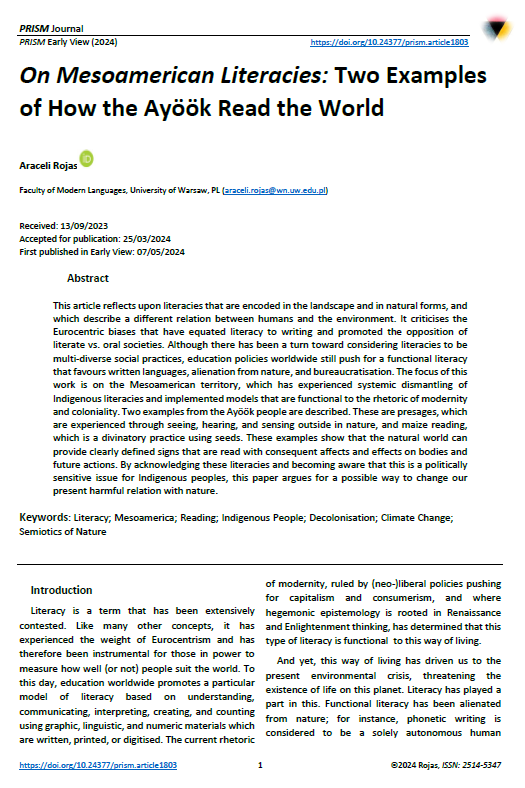On Mesoamerican Literacies: Two Examples of How the Ayöök Read the World
DOI:
https://doi.org/10.24377/prism.article1803Keywords:
literacy, Mesoamerica, reading, indigenous people, Decolonisation, climate change, semiotics of natureAbstract
This article reflects upon literacies that are encoded in the landscape and in natural forms, and which describe a different relation between humans and the environment. It criticises the Eurocentric biases that have equated literacy to writing and promoted the opposition of literate vs. oral societies. Although there has been a turn toward considering literacies to be multi-diverse social practices, education policies worldwide still push for a functional literacy that favours written languages, alienation from nature, and bureaucratisation. The focus of this work is on the Mesoamerican territory, which has experienced systemic dismantling of Indigenous literacies and implemented models that are functional to the rhetoric of modernity and coloniality. Two examples from the Ayöök people are described. These are presages, which are experienced through seeing, hearing, and sensing outside in nature, and maize reading, which is a divinatory practice using seeds. These examples show that the natural world can provide clearly defined signs that are read with consequent affects and effects on bodies and future actions. By acknowledging these literacies and becoming aware that this is a politically sensitive issue for Indigenous peoples, this paper argues for a possible way to change our present harmful relation with nature.
Downloads

Downloads
Published
Issue
Section
License
Copyright (c) 2024 Araceli Rojas

This work is licensed under a Creative Commons Attribution-NonCommercial-NoDerivatives 4.0 International License.
Authors retain copyright and grant the journal the right of first publication with the work.
The version of the article published as part of this issue is licensed under a Creative Commons Attribution-NonCommercial-NoDerivatives 4.0 International Licence and allows others to read, download, copy, distribute, print, search, link to the full text of the first version of this article, or to use it for any other lawful purpose in accordance with the license. The author maintains copyright for the article published in this journal.
This journal provides immediate open access to its content and has no submission or publication fees.


